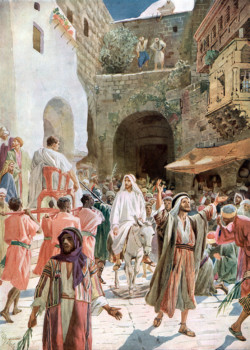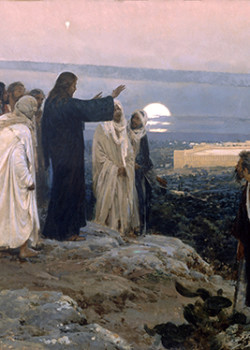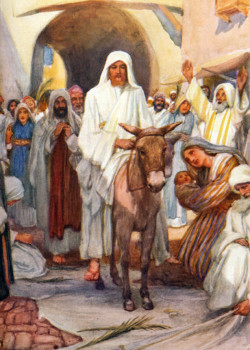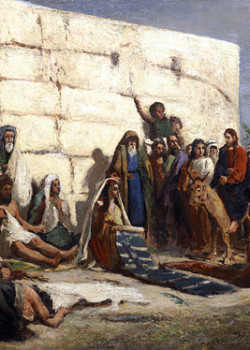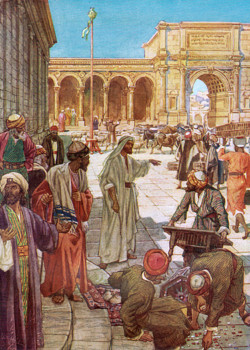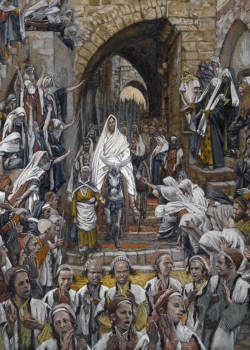
The Prophet of Galilee
There really was no deep significance to be attached to this superficial and spontaneous outburst of popular enthusiasm. This welcome, although it was joyous and sincere, did not betoken any real or deep-seated conviction in the hearts of this festive multitude. These same crowds were equally as willing quickly to reject Jesus later on this week when the Sanhedrin once took a firm and decided stand against him, and when they became disillusioned—when they realized that Jesus was not going to establish the kingdom in accordance with their long-cherished expectations.
But the whole city was mightily stirred up, insomuch that everyone asked, “Who is this man?” And the multitude answered, “This is the prophet of Galilee, Jesus of Nazareth.” ~ The Urantia Book, 172:3.15
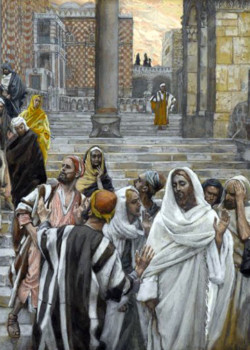
The End of the World?
This Tuesday afternoon, as Jesus and the apostles passed out of the temple on their way to the Gethsemane camp, Matthew, calling attention to the temple construction, said: “Master, observe what manner of buildings these are. See the massive stones and the beautiful adornment; can it be that these buildings are to be destroyed?” As they went on toward Olivet, Jesus said: “You see these stones and this massive temple; verily, verily, I say to you: In the days soon to come there shall not be left one stone upon another. They shall all be thrown down.” These remarks depicting the destruction of the sacred temple aroused the curiosity of the apostles as they walked along behind the Master; they could conceive of no event short of the end of the world which would occasion the destruction of the temple. ~ The Urantia Book, 176:0.1

They shall all be thrown down
This Tuesday afternon, as Jesus and the apostles passed out of the temple on their way to the Gethsemane camp, Matthew, calling attention to the temple construction, said: "Master, observe what manner of buildings these are. See the massive stones and the beautiful adornment; can it be that these buildings are to be destroyed?" As they went on toward Olivet, Jesus said: "You see these stones and this massive temple; verily, verily, I say to you: In the days soon to come there shall not be left one stone upon another. They shall all be thrown down." These remarks depicting the destruction of the sacred temple aroused the curiosity of the apostles as they walked along behind the Master; they could conceive of no event short of the end of the world which would occasion the destruction of the temple. ~ The Urantia Book, 176:0.1

My house shall be called a house of prayer
To the amazement of his apostles, standing near at hand, who refrained from participation in what so soon followed, Jesus stepped down from the teaching platform and, going over to the lad who was driving the cattle through the court, took from him his whip of cords and swiftly drove the animals from the temple. But that was not all; he strode majestically before the wondering gaze of the thousands assembled in the temple court to the farthest cattle pen and proceeded to open the gates of every stall and to drive out the imprisoned animals. By this time the assembled pilgrims were electrified, and with uproarious shouting they moved toward the bazaars and began to overturn the tables of the money-changers. In less than five minutes all commerce had been swept from the temple. By the time the near-by Roman guards had appeared on the scene, all was quiet, and the crowds had become orderly; Jesus, returning to the speaker's stand, spoke to the multitude: "You have this day witnessed that which is written in the Scripture: `My house shall be called a house of prayer for all nations, but you have made it a den of robbers.'" ~ The Urantia Book, 173:1.7
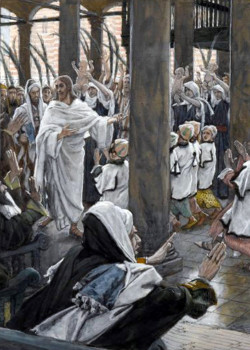
The Prophet of Galilee
There really was no deep significance to be attached to this superficial and spontaneous outburst of popular enthusiasm. This welcome, although it was joyous and sincere, did not betoken any real or deep-seated conviction in the hearts of this festive multitude. These same crowds were equally as willing quickly to reject Jesus later on this week when the Sanhedrin once took a firm and decided stand against him, and when they became disillusioned—when they realized that Jesus was not going to establish the kingdom in accordance with their long-cherished expectations.
But the whole city was mightily stirred up, insomuch that everyone asked, “Who is this man?” And the multitude answered, “This is the prophet of Galilee, Jesus of Nazareth.” ~ The Urantia Book, 172:3.15
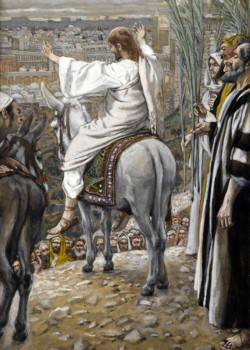
The Royal Son
Before they started, the Alpheus twins put their cloaks on the donkey and held him while the Master got on. As the procession moved toward the summit of Olivet, the festive crowd threw their garments on the ground and brought branches from the near-by trees in order to make a carpet of honor for the donkey bearing the royal Son, the promised Messiah. As the merry crowd moved on toward Jerusalem, they began to sing, or rather to shout in unison, the Psalm," Hosanna to the son of David; blessed is he who comes in the name of the Lord. Hosanna in the highest. Blessed be the kingdom that comes down from heaven."
Jesus was lighthearted and cheerful as they moved along until he came to the brow of Olivet, where the city and the temple towers came into full view; there the Master stopped the procession, and a great silence came upon all as they beheld him weeping. Looking down upon the vast multitude coming forth from the city to greet him, the Master, with much emotion and with tearful voice, said: "O Jerusalem, if you had only known, even you, at least in this your day, the things which belong to your peace, and which you could so freely have had! But now are these glories about to be hid from your eyes. You are about to reject the Son of Peace and turn your backs upon the gospel of salvation. The days will soon come upon you wherein your enemies will cast a trench around about you and lay siege to you on every side; they shall utterly destroy you, insomuch that not one stone shall be left upon another. And all this shall befall you because you knew not the time of your divine visitation. You are about to reject the gift of God, and all men will reject you." ~ The Urantia Book, 172:3.9
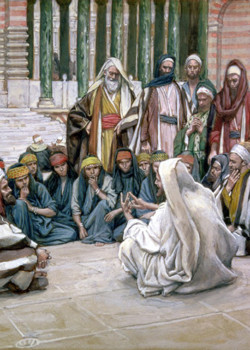
They all sat down by the Treasury
And now, as the evening drew on and the crowds went in quest of nourishment, Jesus and his immediate followers were left alone. What a strange day it had been! The apostles were thoughtful, but speechless. Never, in their years of association with Jesus, had they seen such a day. For a moment they sat down by the treasury, watching the people drop in their contributions: the rich putting much in the receiving box and all giving something in accordance with the extent of their possessions. At last there came along a poor widow, scantily attired, and they observed as she cast two mites (small coppers) into the trumpet. And then said Jesus, calling the attention of the apostles to the widow: “Heed well what you have just seen. This poor widow cast in more than all the others, for all these others, from their superfluity, cast in some trifle as a gift, but this poor woman, even though she is in want, gave all that she had, even her living.” ~ The Urantia Book, 172:4.2

He Went Through the Villages
Jesus had been accepted by these believers as the Messiah, and the Jews knew little or nothing about a suffering Messiah. They did not understand that Jesus was to accomplish many things by his death which could never have been achieved by his life. While it was the resurrection of Lazarus that nerved the apostles to enter Jerusalem, it was the memory of the transfiguration that sustained the Master at this trying period of his bestowal. ~ The Urantia Book, 171:4.9

Can it Be?
This Tuesday Afternoon, as Jesus and the apostles passed out of the temple on their way to the Gethsemane camp, Matthew, calling attention to the temple construction, said: “Master, observe what manner of buildings these are. See the massive stones and the beautiful adornment; can it be that these buildings are to be destroyed?” As they went on toward Olivet, Jesus said: “You see these stones and this massive temple; verily, verily, I say to you: In the days soon to come there shall not be left one stone upon another. They shall all be thrown down.” These remarks depicting the destruction of the sacred temple aroused the curiosity of the apostles as they walked along behind the Master; they could conceive of no event short of the end of the world which would occasion the destruction of the temple. ~ The Urantia Book, 176:0.1

The Evening of the Triumphal Entry into Jerusalem
This Sunday evening as they returned to Bethany, Jesus walked in front of the apostles. Not a word was spoken until they separated after arriving at Simon’s house. No twelve human beings ever experienced such diverse and inexplicable emotions as now surged through the minds and souls of these ambassadors of the kingdom. These sturdy Galileans were confused and disconcerted; they did not know what to expect next; they were too surprised to be much afraid. They knew nothing of the Master’s plans for the next day, and they asked no questions. They went to their lodgings, though they did not sleep much, save the twins. But they did not keep armed watch over Jesus at Simon’s house. ~ The Urantia Book, 172:5.1
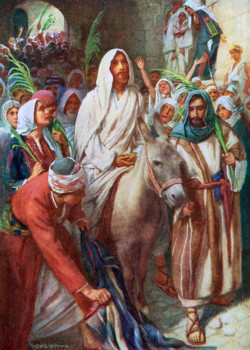
Hosanna in the Highest!
Before they started, the Alpheus twins put their cloaks on the donkey and held him while the Master got on. As the procession moved toward the summit of Olivet, the festive crowd threw their garments on the ground and brought branches from the near-by trees in order to make a carpet of honor for the donkey bearing the royal Son, the promised Messiah. As the merry crowd moved on toward Jerusalem, they began to sing, or rather to shout in unison, the Psalm, “Hosanna to the son of David; blessed is he who comes in the name of the Lord. Hosanna in the highest. Blessed be the kingdom that comes down from heaven.” ~ The Urantia Book, 172:3.9

The Price of Human Bigotry
Jesus said: “From olden times the prophets have perished in Jerusalem, and it is only befitting that the Son of Man should go up to the city of the Father’s house to be offered up as the price of human bigotry and as the result of religious prejudice and spiritual blindness. O Jerusalem, Jerusalem, which kills the prophets and stones the teachers of truth! How often would I have gathered your children together even as a hen gathers her own brood under her wings, but you would not let me do it! Behold, your house is about to be left to you desolate! You will many times desire to see me, but you shall not. You will then seek but not find me.” And when he had spoken, he turned to those around him and said: “Nevertheless, let us go up to Jerusalem to attend the Passover and do that which becomes us in fulfilling the will of the Father in heaven.” ~ The Urantia Book, 171:4.7
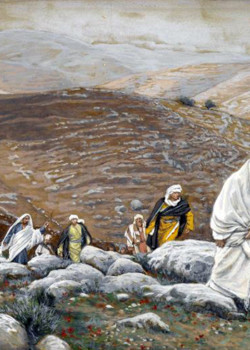
Going up to Jerusalem with the Apostles
Sunday, April 3, Jesus, accompanied only by the twelve apostles, started from Bethsaida on the journey to Jerusalem. To avoid the multitudes and to attract as little attention as possible, they journeyed by way of Gerasa and Philadelphia. He forbade them to do any public teaching on this trip; neither did he permit them to teach or preach while sojourning in Jerusalem. They arrived at Bethany, near Jerusalem, late on Wednesday evening, April 6. For this one night they stopped at the home of Lazarus, Martha, and Mary, but the next day they separated. Jesus, with John, stayed at the home of a believer named Simon, near the house of Lazarus in Bethany. Judas Iscariot and Simon Zelotes stopped with friends in Jerusalem, while the rest of the apostles sojourned, two and two, in different homes. ~ The Urantia Book, 152:7.1

